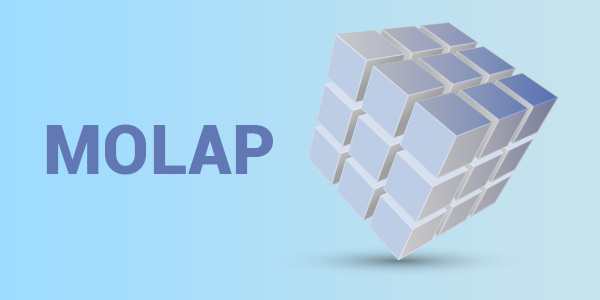Overview
There are basically three types of online analytical processing: MOLAP, ROLAP, and HOLAP. In this article we’re going to speak about MOLAP particularly. MOLAP is short for multidimensional online analytical processing: it is taken for the traditional version of OLAP. It’s noted for its competitive speed and high user-responsiveness. MOLAP's core attribute constitutes data maintenance in a multidimensional structure which is commonly referred to as a cube. The cube is populated with data from the operational databases (CRM, ERP, AP etc.) or from the data warehouse. The cube includes a fact table in the center and multiple dimensions with the required information. If the cube has more than three dimensions it is taken for a hypercube. Before data processing and analyzing MOLAP tools require precalculating data aggregations to build dimensions for the cube. Due to the aggregations, MDX queries are run rapidly and it’s one of the main MOLAP’s advantages. Nevertheless, the very process of cube build for multidimensional online analytical processing may take up a lot of time depending on the number of aggregations needed to be computed.
Comparison with ROLAP and HOLAP
As compared with MOLAP, ROLAP, as the name implies, operates directly with relational databases. Fact data and dimension tables are stored in relational tables. In contrast to MOLAP tools, ROLAP tools don’t comprise data precomputation and that is the reason why the performance isn’t fast as the queries are composed towards relational tables.
In hybrid OLAP - HOLAP, some aggregations are stored in a multidimensional structure as well as in MOLAP, though sometimes the database exploits relational tables to maintain bigger detailed data quantities. When there’s a need to extract requisite information from HOLAP the system calls the database through information from the fact table, as well as in ROLAP.
Architecture
- MOLAP cube is composed of the following elements:
- Database server;
- MOLAP server;
- Front-end tool.
Benefits
- MOLAP is famous for efficient and fast performance owing to streamlined indexing and optimizations in the storage. Data is rapidly extracted, can be sliced and diced to provide different views of the information.
- Multidimensional OLAP provides all potential data combinations displayed in the multidimensional array and an opportunity to directly access these combinations.
- Multidimensional online analytical processing system requires less storage space in comparison with ROLAP due to compression techniques.
- MOLAP is easily deployed and compact thereby suits for low dimension datasets
Drawbacks
- MOLAP cubes can’t be changed and have to be developed before being exploited.
- The amount of data which the system can manage is limited.
- MOLAP technology is proprietary and requires both human and financial resources investment.
- The type of OLAP described in the article provides users with in-depth multidimensional data analysis, trends awareness and predictions for successful business development.
Products
When it comes to choosing a MOLAP solution out of the range presented in the market it’s good to know such reliable tools as MicroStrategy, Cognos Powerplay, Microsoft Analysis Services, icCube, Oracle Database OLAP Option, TM1, Essbase, etc.
Conclusion
- MOLAP system is aimed to handle data and provide regular and logical responses to users’ requests;
- The tools of MOLAP require rapid performance;
- The server has to accept two levels of the data storage in order to manage data density;
- The sub-cubes with higher density are classified and stored as array structure;
- The sub-cubes with higher sparsity exploit the technology of compression.
